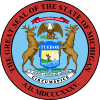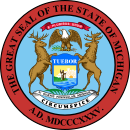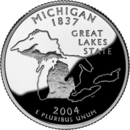Portal:Michigan
The Michigan Portal  Michigan (/ˈmɪʃɪɡən/ MISH-ig-ən) is a state in the Great Lakes region of the Upper Midwest region of the United States. It borders Wisconsin to the northwest in the Upper Peninsula, and Indiana and Ohio to the south in the Lower Peninsula; it is also connected by Lakes Superior, Michigan, Huron, and Erie to Minnesota and Illinois, and the Canadian province of Ontario. With a population of nearly 10.12 million and an area of 96,716 sq mi (250,490 km2), Michigan is the 10th-largest state by population, the 11th-largest by area, and the largest by area east of the Mississippi River. Its capital is Lansing, and its largest city is Detroit. Metro Detroit is among the nation's most populous and largest metropolitan economies. The name derives from a gallicized variant of the original Ojibwe word ᒥᓯᑲᒥ (mishigami), meaning "large water" or "large lake". Michigan consists of two peninsulas. The Lower Peninsula resembles the shape of a mitten, and comprises a majority of the state's land area. The Upper Peninsula (often called "the U.P.") is separated from the Lower Peninsula by the Straits of Mackinac, a five-mile (8 km) channel that joins Lake Huron to Lake Michigan. The Mackinac Bridge connects the peninsulas. Michigan has the longest freshwater coastline of any political subdivision in the United States, being bordered by four of the five Great Lakes and Lake St. Clair. It also has 64,980 inland lakes and ponds. Michigan has the second-most water area of any state, behind only Alaska. The area was first occupied by a succession of Native American tribes over thousands of years. In the 17th century, French explorers claimed it as part of the New France colony, when it was largely inhabited by Indigenous peoples. French and Canadian traders and settlers, Métis, and others migrated to the area, settling largely along the waterways. After France's defeat in the French and Indian War in 1762, the region came under British rule. Britain ceded the territory to the newly independent United States after its defeat in the American Revolutionary War. The area was part of the larger Northwest Territory until 1800, when western Michigan became part of the Indiana Territory. Michigan Territory was formed in 1805, but some of the northern border with Canada was not agreed upon until after the War of 1812. Michigan was admitted into the Union in 1837 as the 26th state, a free one. It soon became an important center of industry and trade in the Great Lakes region, attracting immigrants in the late 19th and early 20th centuries from many European countries. Immigrants from Finland, Macedonia, and the Netherlands were especially numerous. Migration from Appalachia and of Black Southerners as part of the Great Migration increased in the 1930s, with many settling in Metro Detroit. Although Michigan has developed a diverse economy, in the early 20th century it became widely known as the center of the U.S. automotive industry, which developed as a major national economic force. It is home to the country's three major automobile companies (whose headquarters are all in Metro Detroit). Once exploited for logging and mining, today the sparsely populated Upper Peninsula is important for tourism because of its abundance of natural resources. The Lower Peninsula is a center of manufacturing, forestry, agriculture, services, and high-tech industry. (Full article...) Entries here consist of Good and Featured articles, which meet a core set of high editorial standards.
In a Major League Baseball game played on June 2, 2010, at Detroit's Comerica Park, Detroit Tigers pitcher Armando Galarraga nearly became the 21st pitcher in Major League Baseball history to throw a perfect game. Facing the Cleveland Indians, Galarraga retired the first 26 batters he faced. His bid for a perfect game was ruined one out short when first-base umpire Jim Joyce incorrectly ruled that Indians batter Jason Donald reached first base safely on a ground ball. Galarraga instead finished with a one-hit shutout in a 3–0 victory. He faced 28 batters and threw 88 pitches (67 strikes and 21 balls), striking out three. The game is sometimes referred to as the "28-out perfect game", the "Almost Perfect" game, the "Extra Perfect Game", the "Imperfect Game" or simply the "Galarraga game." Joyce was tearful and apologetic upon meeting with Galarraga after the game after realizing that he had made an incorrect call. Galarraga was forgiving and understanding of the mistake, telling reporters after the game, "Nobody's perfect". Many others throughout Major League Baseball subsequently voiced their support for Joyce. The sportsmanship demonstrated by Galarraga and Joyce earned them widespread praise for their handling of the incident. (Full article...)Selected picture - Campus Martius Park is a re-established park in downtown Detroit, Michigan. After the fire of 1805, Campus Martius (from the Latin for Field of Mars, where Roman heroes walked) was the focal point of judge Augustus Woodward's plans to rebuild the city. Did you know -
Related portalsSelected article -Kalamazoo/Battle Creek International Airport (IATA: AZO, ICAO: KAZO, FAA LID: AZO) is a county-owned public airport in Kalamazoo, Kalamazoo County, Michigan, US, 3 miles (4.8 km) southeast of Downtown Kalamazoo. The airport is located approximately 20 miles (32 km) west of the city of Battle Creek. It is included in the Federal Aviation Administration (FAA) National Plan of Integrated Airport Systems for 2023-27, in which it is categorized as a non-hub primary commercial service facility. The airport has an Airport Traffic Control Tower (ATCT) and a Terminal Radar Approach Control (TRACON). It has one passenger terminal and five gates. Three airlines operate flights in and out of AZO. (Full article...)Selected biography -
Judith O. Becker (born September 3, 1932) is an American academic and educator. She is a scholar of the musical and religious cultures of South and Southeast Asia, the Islamic world and the Americas. Her work combines linguistic, musical, anthropological, and empirical perspectives. As an ethnomusicologist and Southeast Asianist, she is noted for her study of musics in South and Southeast Asia, including Javanese gamelan, Burmese harp, music and trance, music and emotion, neuroscience, and a theoretical rapprochement of empirical and qualitative methods. Becker teaches at the University of Michigan. In 2000, Becker was named the Glenn McGeoch Collegiate Professor of Musicology at the University of Michigan, and she was named professor emerita of music in 2008. From 1993 to 1997, she was a Senior Fellow of the Michigan Society of Fellows. (Full article...)
General imagesThe following are images from various Michigan-related articles on Wikipedia.
TopicsCategoriesSymbols
Lists
Related pagesWikimediaThe following Wikimedia Foundation sister projects provide more on this subject:
Things you can doDiscover Wikipedia using portals | ||||||||||||||||||||||||||||||||||||










































































